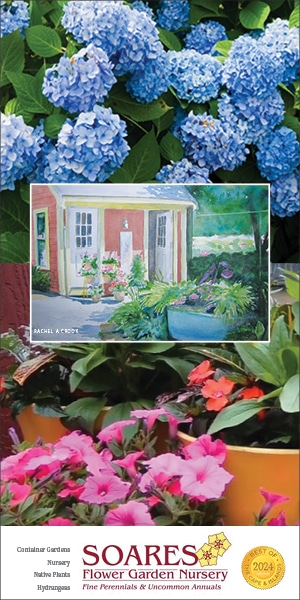
Heritage’s hydrangeas
Cape Cod Home / Summer 2017 / Home, Garden & Design, People & Businesses
Writer: Julie Craven Wagner
Heritage’s hydrangeas

Cape Cod Home / Summer 2017 / Home, Garden & Design, People & Businesses
Writer: Julie Craven Wagner

Photo courtesy of Heritage Museums & Gardens, Sandwich
Heritage Museums & Gardens track data & best practices with their Hydrangea Test Garden
A Cape summer would not be complete without the bouncing, bouffant images of our beloved blue hydrangeas dotting the landscape. So much are these shrubs adored, that the Cape Cod Chamber of Commerce introduced the Cape Cod Hydrangea Festival in 2015 to international acclaim, drawing tens of thousands of visitors to the Cape in July to experience the blue beauties.
In 2016, Heritage Museums & Gardens in Sandwich, arguably a national treasure in the world of horticulture, introduced their North American Hydrangea Test Garden. Conceived by renowned plant expert Michael Dirr, professor of horticulture at the University of Georgia, the garden is not only a beautiful addition to the 100 acres of landscaped grounds at Heritage, but also provides a research function for data collection that is shared nationally.
Designed by Heritage’s Director of Horticulture, Les Lutz, the garden augmented the 155 hydrangea species already inherent to their collection, by including new re-bloomer species such as, Bloom StruckTM, Twist ‘n ShoutTM and Blushing BrideTM, recently developed by Bailey Nurseries, grower of the very popular Endless SummerTM hydrangea. Additional complementary plants, a water feature and meandering pathways make a visit to the garden not only an educational one, but also a feast for the senses.
Lutz explains the appeal of these new hydrangeas that have been developed to give gardeners what they want – more blooms. “Endless Summer and these others have the genetic ability to flower on the current year’s growth, which has changed everything,” he says. He is not bashful when he describes his new personal favorite of the re-bloomer varieties, Twist ‘n ShoutTM, “It has been a really impressive variety, I’ve seen it die all the way back to the ground after 2016’s harsh winter, leaf out, have a two week delay on its initial bloom, and then continue to put out buds right up until frost.” Star Roses is another grower that has partnered with Heritage in this endeavor by providing their re-bloomer species to round out the mix. Looking forward to 2017 and 2018, the test garden will see new varieties of hydrangeas unveiled.

L to R: Matt Condon, Ryan McEnaney, Dr. Michael Dirr, Ellen Spear, Les Lutz cut the ribbon to officially open the North American Hydrangea Test Garden. For more information on Heritage’s Test Garden, visit heritagemuseumsandgardens.org Photo courtesy of Heritage Museums & Gardens, Sandwich
When asked what Heritage envisions visitors will learn from the new demonstration garden, Lutz says that he thinks the average gardener will learn how to use these new hydrangeas in a landscape setting, by incorporating them into a space with other plants. “We designed it from a designer’s perspective, pairing with other companion plants.” Those companion plants include day lillies, monardia, coneflower, and another of Lutz’s favorites, caryopteris, providing silver foliage, and an intense blue flower that continues into the fall when others have given up. Pink and white astilbe, hostas and ferns are used in the shadier areas.
“One of the best ways to get the look professionals achieve,” says Lutz, “is to use more than one of the same variety of plant – massing. Massing is more effective than a single plant, and repeating that throughout, carries your eye and creates movement like a wave through the garden.” According to Lutz, texture and variation, give visual interest to the garden as well; like the smaller leaves of catnip juxtaposed against the larger leaves of hydrangeas.
Lutz says a transition of light throughout the day is optimal; essentially morning sun and afternoon shade. The heat of the day can leave the shrubs looking wilted and frail, but can be effectively countered by making sure the soil is a well-composted mix and ideally incorporates a drip irrigation system. For those aiming for the most robust and plentiful season of blooms, this extra effort is more than worth it.
After the first year with the revolutionary test garden, Lutz says they have learned some things already. “The realization or understanding that these new re-bloomer varieties can tolerate our New England climate better than a lot of the older varieties is very important to the average gardener. I think if people come check out the garden they will be amazed at the varieties and the variation of color, size of mop-head, and incredible beauty these plants can offer.”



